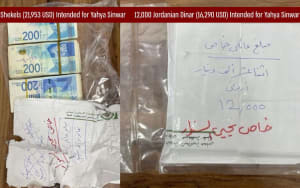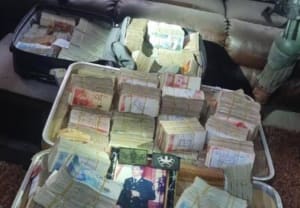Hamas uses secret cash delivery network to continue paying workers during war – report
Civil servants say they rely on aid distribution sites to feed their families

Despite being severely weakened as a result of the nearly two-year war in Gaza, Hamas leadership continues to make payments to some of its civil workers using a secret cash-based payment system, the BBC Network reported on Wednesday.
The news agency spoke to three civil servants employed by Hamas who said they had received payments of around $300 within the past week. However, the payments are mostly symbolic, representing around 20% of the workers' pre-war salary.
With rising inflation and food merchants in Gaza often adjusting prices according to humanitarian aid delivery schedules, the small payments have barely helped the workers to get sufficient supplies, leading to increasing resentment.
The BBC reported that even receiving their limited salaries has become dangerous for the workers, as Hamas often uses the same couriers and cash-routing networks for paying both its fighters and the civil servants working for the municipal arm of Hamas.
Israel has begun targeting Hamas salary distributors in an attempt to disrupt Hamas’ ability to pay its fighters and its ability to govern in the Strip, as it seeks to defeat the terror group entirely.
The BBC report describes a system that almost operates like an espionage network, with Hamas workers receiving encrypted messages on their mobile phones with instructions to go to specific locations at specific times.
One civil servant told the British news agency that messages often invite the person to “meet a friend for tea.”
The report also appears to provide the backdrop for some recent Israeli strikes within the central Gaza area, such as a recent launch on a cafe in Gaza City frequented by Hamas civil officials and another incident that resulted in a nearby market stall being struck.
“Every time I go to pick up my salary, I say goodbye to my wife and children. I know that I may not return,” one civil servant told the BBC. “On several occasions, Israeli strikes have hit the salary distribution points. I survived one that targeted a busy market in Gaza City.”
Another worker, a schoolteacher, said he has recently started receiving “worn-out banknotes,” as the flow of cash – typically supplied from Israel before the war – was cut off, with no new currency entering the Strip since the outbreak of the war on Oct. 7, 2023.
"I received 1,000 shekels (about $300) in worn-out banknotes – no trader would accept them. Only 200 shekels were usable – the rest, I honestly don't know what to do with," the teacher told the BBC.
He said that recently he has been forced to “go to aid distribution points in the hope of getting some flour to feed my children.”
The BBC report cited a senior Hamas figure familiar with the terror group’s financial system who claimed Hamas had hidden around $700 million in cash inside tunnels before the war. The official said the money had been under the supervision of former Hamas leader Yahya Sinwar before his death.
The IDF has previously reported finding large cash reserves in several of the tunnels it has discovered and explored in Gaza. The BBC report stated that Hamas has paid about $7 million to its civil servants throughout the war, drawing on the previously hidden cash reserves.
In early 2024, the IDF seized over NIS 1 billion ($300 million) in a raid on a Hamas-linked bank in Khan Younis, further disrupting the terror group's ability to pay both militants and civil servants.
🔴i24NEWS EXCLUSIVE:
— i24NEWS English (@i24NEWS_EN) February 20, 2024
Over $250 million was seized from 12 safes at a central bank during a Khan Yunis military operation over the past 2 days, security sources tell i24NEWS military correspondent @MatthiasInbar
The terror group is also known to use the sale of humanitarian aid in the markets to finance its operations. Even though humanitarian aid entering the Strip is supposed to be distributed freely to residents under the supervision of the United Nations and other NGOs, much of the aid appears for sale in the markets within hours of entering the enclave.
Gaza residents have also testified to the seizure of aid by armed gunmen affiliated with Hamas, saying Hamas collects a 20% fee for all sales by the merchants working with it.
While the UN has routinely disputed Israel’s claim that Hamas is confiscating aid being distributed in the Strip, it recently admitted that around 87% of all aid trucks entering Gaza are intercepted by armed gangs or Gaza residents before reaching distribution centers. In spite of this, the UN has refused to allow the IDF to provide security for the aid routes.

The All Israel News Staff is a team of journalists in Israel.
You might also like to read this:
















